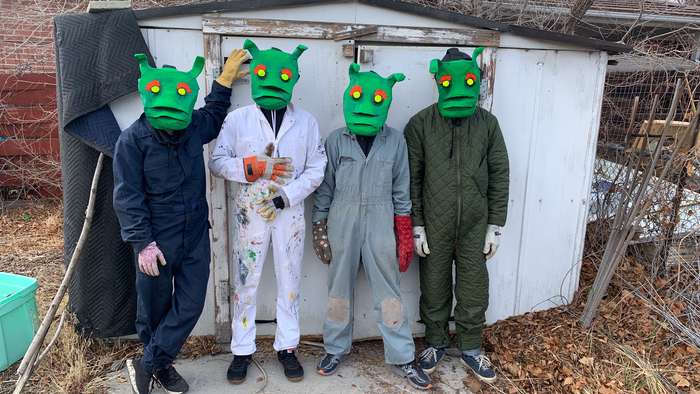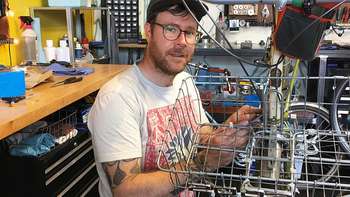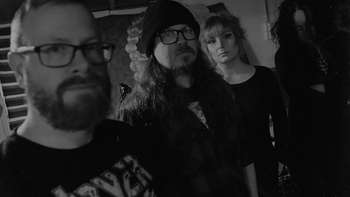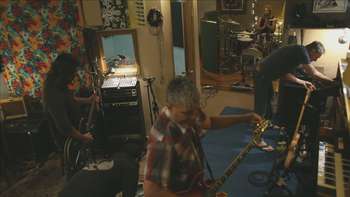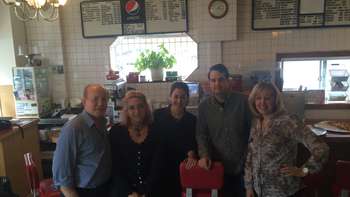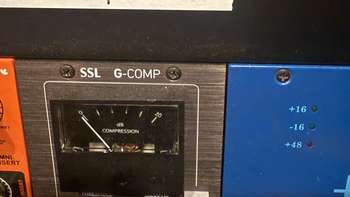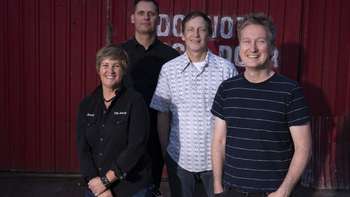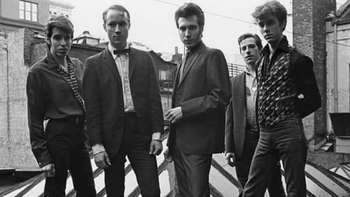There are a lot of misconceptions about the life of a musician. Most musicians have day jobs – and not just to pay the bills. Jobs provide new challenges, personal fulfillment and, yes, some rent or gas money.
How an artist spends their time by day will influence the creative process at night. In Don’t Quit Your Day Job, Scene Point Blank looks at how musicians split their time, and how their careers influence their music (or how their music provides escape).
In this edition, we chat with Ilya Arbatman of Rotary Club, plus Book Slanger and Party Planner at The Radical Cat, an independent book store and cat adoption center in Reno, NV.
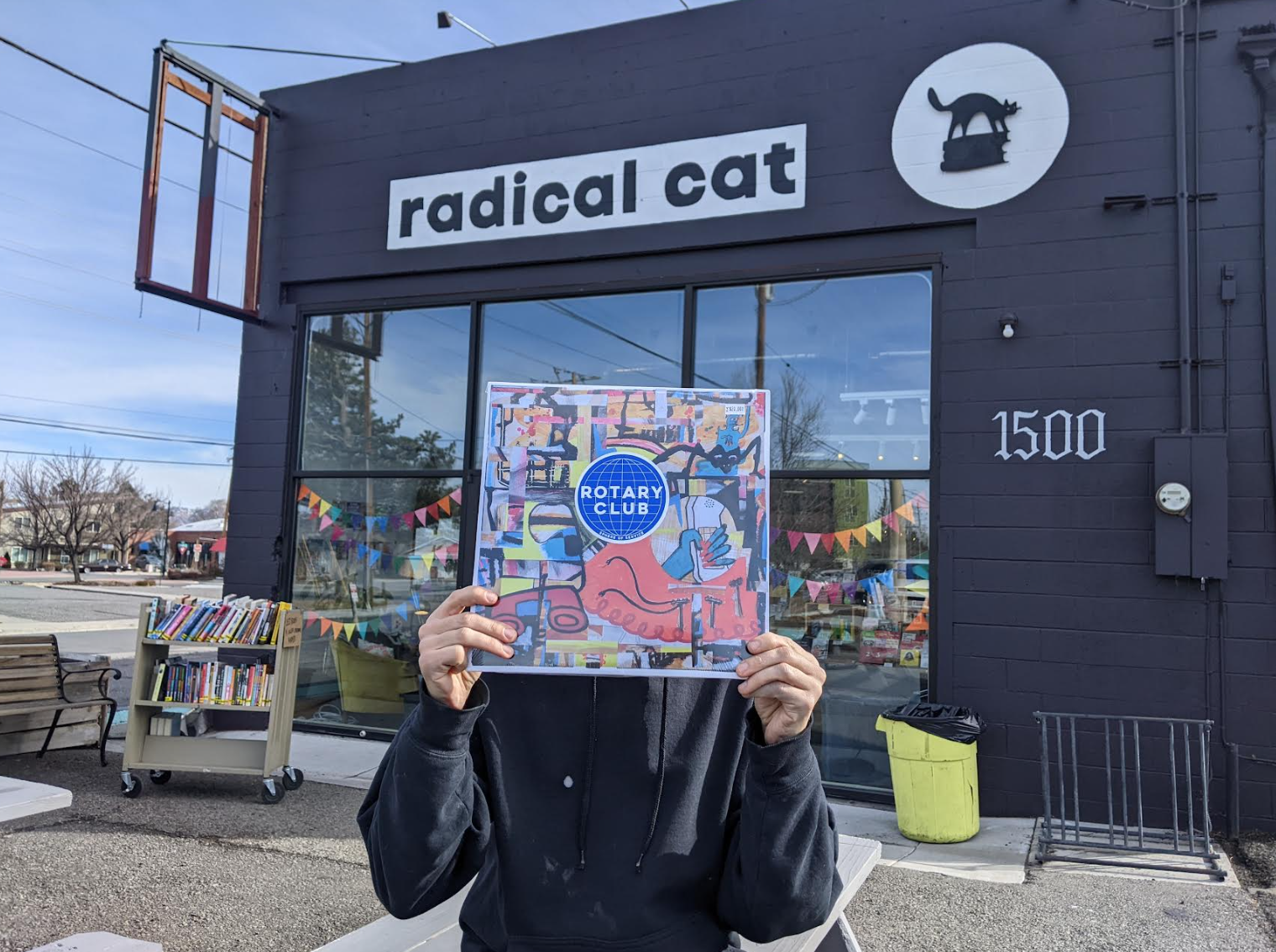
Scene Point Blank: First, your title is co-owner of a radical book store, The Radical Cat. What does that title mean in a general sense? How many owners are there? Are you a jack of all trades, or do you have a specific focus?
Ilya Arbatman: The Radical Cat is essentially run by three people: myself, my partner Rosie and our one amazing worker, Lola. Lola is the kid of Melissa, whose partner is Mike. Mike and Melissa are the other two owners, but neither of them work at the store. They help with the big shit that we could never do without them, such as writing our budget (Melissa), merchandising the entire store after a truly hectic move (Melissa), building bookshelves, hanging light fixtures, painting our entire new building in one day, making custom vinyl bins, fixing the roof, installing a bike rack...this list goes on (Mike).
I am a jack of all trades in that I handle a lot of the day-to-day stuff, including little repairs or new fixtures, or setting up our new point of sale system or getting up on a scissor lift with two very generous and, unfortunately, scared-of-heights friends to hang our enormous new sign.
On a normal day, though, I just hang out at the counter, selling and shelving books! I also do most of the event coordinating for things that happen at the shop. Rosie handles all the really important logistics and bookkeeping, from ordering books, to paying our bills, to making sure special orders are getting placed, to frontlist research, to keeping our inventory accurate and up-to-date, to keeping the store stocked, tidy, and clean. She also just hangs out at the counter, selling and shelving. And The Radical Cat also hosts adoptable cats in a special room at the back of the shop. Rosie handles pretty much all of that, processes the adoptions, communicates with the organizations we work with, and generally just works wonders with even the shyest, weirdest cats.
Scene Point Blank: What is an "average day" on the job?
Ilya Arbatman: Get there around 9:45am (we open at 10). Turn on the lights, turn on the music, boot up the computer and wait for the book-loving masses to start pouring in...
Usually I will spend any downtime working on the events calendar, getting flyers made, trying to figure out what kind of events we'll have over the next few months, doing some big-picture planning for things that may be a bit further out (Indie Bookstore Day, our 'Birthday Weekend,' potentially some book fair-type stuff for our new building's huge parking lot). Boxes of books might come in that need to be unpacked, checked off, and shelved. We are a small shop with a small selection, which means a bit more of an intimate environment, especially because there is almost always just one person working. That means we pretty regularly talk to people coming in, help them find what they are looking for or offer some suggestions, and place orders if it's a book we are out of or do not carry. If there is an event in the evening, we move a few of our bookshelves out of the way and set up some rows of chairs for peeps to sit in.
Scene Point Blank: Books are undoubtedly the focus at The Radical Cat. But you're next to a coffee shop and you also have cats, and now a record store too. How do you pull it all together while maintaining a core identity as a bookstore?
Ilya Arbatman: We are actually no longer next to a coffee shop :(( We had to move late last year because our landlord was trying to triple our rent. We moved literally a block away, though, so we are still in the same neighborhood and can smell the coffee roasting just down the street. The record store component is new and very exciting! Part of the reason we pulled the trigger on our new spot is that we could visualize a special zone for records and we knew just the person for the job -- in case you didn't know, Finetooth Records (the record shop inside The Radical Cat) is Jon Kortland of Iron Lung. [Editor’s note: this interview was initiated via Iron Lung Records.]
To answer the question, though, the bookstore was always a bit of a means to an end for us. The cat component actually came first. Rosie had been doing a pop-up cat adoption lounge yearly at the all ages arts and music space down the street from us (The Holland Project). We had wanted to find a way to merge the cat adoption lounge project with something a bit more stable so we could have a permanent location. The goal was always the creation of a community space where all kinds of different shit goes down. Even though we are deep in the book world now, we never lose sight of our original mission, so to speak, which is to have a spot where all kinds of people like to go and feel seen, welcome, and able to be themselves.
Scene Point Blank: What was your job history like leading up to this? Did you previously work in coffeeshops, record stores, or bookstores? What pushed you to this store right now? How did you know you wanted to be in charge, so to speak.
Ilya Arbatman: My job history is quite odd. I did once work at a Philz coffee (the one that used to be on Shattuck in Berkeley) for 6 months and my first job, as a fresh college dropout, was at Staff of Life, a natural foods hippie-dippie store in Santa Cruz. For the past few years leading up to the opening of the store, I had three gigs I was hustling: teaching after-school chess to elementary school kids, fixing electronics, and running sound + doing tons of other crap at The Holland Project. I was also occasionally recording bands down in my basement, where I have an all-analog setup that seems to scare Gen Z (which is partially why I have not been recording as much).
When a big change happens in your life, it sometimes takes a little while to figure out exactly what happened and why. When I think back on it now, though, I can see how the hustling life had gotten me into a kind of rut. Or, to put it another way, I was ready for a change. In my distant past, I narrowly escaped a life in academia, but I have always really, really loved books and reading. When I first dropped out of college and was living the deadbeat life in Santa Cruz, all I really did other than work and play music was get books from the library and read, read, read. When the bookstore, pretty much out of nowhere, became a possibility, it was like some weird gears of fate had clicked into place. You know how your friends from childhood sometimes end up doing exactly the thing they were always meant to do? Often after years of trying other shit that never quite sticks? I am almost 40 and maybe that's around the age where some of that stuff finally starts to happen -- or not. You get what I'm saying. And it's not so much being in charge, because I am not really -- we all just do our thing -- but starting The Radical Cat was, I think, something I was always meant to do.
Scene Point Blank: How long have you played music? How has that overlapped with your career? Were you doing one before the other?
Digging deeper: Did playing music influence your path in any direct or indirect way, whether that means literally meeting your co-owners, or something indirect such as how working at an independent shop inspires music-making?
Ilya Arbatman: I have played music since I was a kid. I lied to the new transfer student at my middle school and told him I knew how to play drums (I had never even seen a drum kit) and we started a band. That was about 25 years ago. I am sure a lot of people might say something to this effect, but playing music has, in one way or another, determined most of the things that have happened in my life. In high school, playing DIY shows around the Bay Area opened my eyes to how much bigger and more interesting the world was than my snotty prep school. I honed a certain sense of power and autonomy back then, maybe more tritely called “believing in yourself,” but that has certainly gotten me to where I am today. I dropped out of college and moved to Santa Cruz because I didn't want to go to school, damnit, I wanted to play the drums! I met Rosie there and we have not been apart for more than a few days at a time since.
For many years, going on tour meant that I could only work certain kinds of jobs. As I got a bit older, I started to get more into recording and live sound. I learned how to run live sound as a volunteer at Gilman for a few years. That led to tinkering and learning how to work on amps and other electronics. When Rosie and I decided to move to Reno, I was able to get a job at an awesome little music shop (no longer around, alas), as the on-site repair person. Shortly after moving here, I also started doing sound at Holland. That was about 10 years ago. So, yeah, music has played a huge role in shaping what I have done to get by over the years.
Scene Point Blank: How often does music or the fact that you're in a band come up in the store?
Ilya Arbatman: Almost never, thankfully! Rosie and I are weird about this but we don't usually like to talk about music stuff, so unless someone brings it up, we certainly won't be!
Scene Point Blank: You host authors. Do you also host live music?
Ilya Arbatman: Not yet, but there has been some murmurs about doing parking lot shows in the summertime.
Scene Point Blank: There has always been overlap between writing narrative pieces and writing music, but I feel like I see more books now, either about music or by musicians on other topics. How do you think the two scenes overlap?
Ilya Arbatman: Well, I think a lot of musicians often have much more interesting things to say than their bands allow. And by “allow,” I don't mean permit -- it's just that you can only fit so many ideas into a snarky, three-minute song, and some of them have to repeat. I don't love, or really read very much, writing about music, but I do really enjoy some musicians' writing. Sam McPheeters' book Mutations is incredible, as are all of Ian Svenonius' books. Crying in H Mart, by Michelle Zauner of Japanese Breakfast, is a brutal and beautiful book. My friend and drummer of the Reno band Fine Motor, Casey Bell, wrote an amazing book of short stories called Little Fury.
Scene Point Blank: As co-owner you have a lot of responsibility at the store. How does that affect touring? Can you get a way for 1-2 weeks at a time?
Ilya Arbatman: Well, I really have not toured that much at all for the past few years. If we really wanted to, we could always close the store for a few days but, honestly, the bigger obstacle is just other peoples' schedules. More and more of our friends have kids and real-ass jobs that don't give great time off -- you know how it goes! Rotary Club is going up to the Northwest at the end of this week for the first time ever, though, and I am so, so excited for that. These days, getting away for a few days to play music and drive and hang out really gives me some deep nourishment and rejuvenation.
Scene Point Blank: Does that schedule affect the band in other ways, like maybe you have to tour during a particular time of year? Have you ever had an emergency call and had to skip out on practice?
Ilya Arbatman: Like I said, touring is not really a regular concern, so it does not come up that often. If we go out of town, it's usually just for a weekend or maybe three days. I have definitely had things come up during practice where I had to leave and do some shit and then come back. Luckily, we live about a 5 minute drive from the store, so when that does happen, it's not a huge deal.
Scene Point Blank: How do you balance everything? Do you set schedules or block off time to write new music or practice with the band?
Ilya Arbatman: Balance! How do we balance everything? I wish I had a better answer -- it's a work in progress! Part of the balance for me has actually been reducing my other commitments. I am not teaching chess anymore, I have seriously limited repair jobs I take on, and I am only doing sound once or twice a month now. We do try and practice every week. And Rosie and I have another band, Grub, that we make time for as well. Practice often feels like some much-needed physical and creative activity after a day spent standing behind the counter. Scheduling-wise, we generally play things week-by-week and just try to be intentional about keeping at least some evenings free so we can jam.
Scene Point Blank: Has The Radical Cat, or any experiences within the store, influenced any of your songs directly that you can share?
Ilya Arbatman: Good question, but no! Not yet.
Scene Point Blank: What advice would you give to somebody who might want to pursue a similar path of opening a business in this unique scene?
Ilya Arbatman: Do it! It is not nearly as challenging as it may seem. To give some credit where it's due, we got a ton of help from Firestorm Books, a queer feminist bookshop collective in Asheville, when we were working on opening the store. That's the rad thing about radical small business -- we help each other out! They gave us so much time and knowledge and we've still never even met in person. So, to rephrase: do it, but get some help!
Scene Point Blank: You also build/fix amps. Is having a side gig essential when running this type of store, or is it more of a keeping-busy kind of thing?
Ilya Arbatman: At this point, it's really just going on inertia. I like to tinker and I have a workshop in the basement. It feels good to have some extra coffee cash on hand but, realistically, it probably creates more stress for me than benefit.
No, having a side gig is not essential. Only for weirdoes like me who always need to be doing more than is necessary.
Check out previous entries in the Don’t Quit Your Day Job series.
--
Upcoming Rotary Club tour dates:
Wednesday, May 28th
7 PM $15/$20
The Holland Project
140 Vesta Street
Reno, NV
CIVIC
Rotary Club
Orrral Fixation
Friday, May 30th
8 PM $15/$20
Art Boutiki
44 Race St.
San Jose, CA
Rotary Club
HLLLYH
Stratosphere
Saturday, May 31st
9 PM (price unknown)
Dark Nectar Coffee
5915 Entrada Ave
Atascadero, CA
Typewriter
Rotary Club
Net WØrth
Sunday, June 1st
6 PM $10
Witch's Lair
Buckeye Ln
Davis, CA
Rotary Club
Nasty Pussy
(last local TBA)
